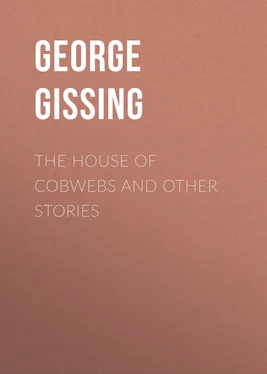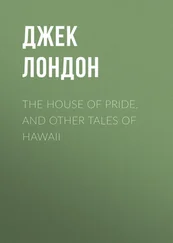George Gissing - The House of Cobwebs and Other Stories
Здесь есть возможность читать онлайн «George Gissing - The House of Cobwebs and Other Stories» — ознакомительный отрывок электронной книги совершенно бесплатно, а после прочтения отрывка купить полную версию. В некоторых случаях можно слушать аудио, скачать через торрент в формате fb2 и присутствует краткое содержание. Жанр: foreign_prose, literature_19, foreign_antique, на английском языке. Описание произведения, (предисловие) а так же отзывы посетителей доступны на портале библиотеки ЛибКат.
- Название:The House of Cobwebs and Other Stories
- Автор:
- Жанр:
- Год:неизвестен
- ISBN:нет данных
- Рейтинг книги:5 / 5. Голосов: 1
-
Избранное:Добавить в избранное
- Отзывы:
-
Ваша оценка:
- 100
- 1
- 2
- 3
- 4
- 5
The House of Cobwebs and Other Stories: краткое содержание, описание и аннотация
Предлагаем к чтению аннотацию, описание, краткое содержание или предисловие (зависит от того, что написал сам автор книги «The House of Cobwebs and Other Stories»). Если вы не нашли необходимую информацию о книге — напишите в комментариях, мы постараемся отыскать её.
The House of Cobwebs and Other Stories — читать онлайн ознакомительный отрывок
Ниже представлен текст книги, разбитый по страницам. Система сохранения места последней прочитанной страницы, позволяет с удобством читать онлайн бесплатно книгу «The House of Cobwebs and Other Stories», без необходимости каждый раз заново искать на чём Вы остановились. Поставьте закладку, и сможете в любой момент перейти на страницу, на которой закончили чтение.
Интервал:
Закладка:
'Danbury Hill, rising thick-wooded to the village church, which is visible for miles around, with stretches of heath about its lower slopes, with its far prospects over the sunny country, was the pleasant end of a pleasant drive.'—( The Nether World , pp. 164-165.)
The first part of this description is quite masterly—worthy, I am inclined to say, of Flaubert. But unless you are familiar with the quiet, undemonstrative nature of the scenery described, you can hardly estimate the perfect justice of the sentiment and phrasing with which Gissing succeeds in enveloping it.
Gissing now turned to the submerged tenth of literature, and in describing it he managed to combine a problem or thesis with just the amount of characterisation and plotting sanctioned by the novel convention of the day. The convention may have been better than we think, for New Grub Street is certainly its author's most effective work. The characters are numerous, actual, and alive. The plot is moderately good, and lingers in the memory with some obstinacy. The problem is more open to criticism, and it has indeed been criticised from more points of view than one.
'In New Grub Street ,' says one of his critics, 13 13 Dolman in National Review , vol. xxx.; cf. ibid ., vol. xliv.
'Mr. Gissing has endeavoured to depict the shady side of literary life in an age dominated by the commercial spirit. On the whole, it is in its realism perhaps the least convincing of his novels, whilst being undeniably the most depressing. It is not that Gissing's picture of poverty in the literary profession is wanting in the elements of truth, although even in that profession there is even more eccentricity than the author leads us to suppose in the social position and evil plight of such men as Edwin Reardon and Harold Biffen. But the contrast between Edwin Reardon, the conscientious artist loving his art and working for its sake, and Jasper Milvain, the man of letters, who prospers simply because he is also a man of business, which is the main feature of the book and the principal support of its theme, strikes one throughout as strained to the point of unreality. In the first place, it seems almost impossible that a man of Milvain's mind and instincts should have deliberately chosen literature as the occupation of his life; with money and success as his only aim he would surely have become a stockbroker or a moneylender. In the second place, Edwin Reardon's dire failure, with his rapid descent into extreme poverty, is clearly traceable not so much to a truly artistic temperament in conflict with the commercial spirit, as to mental and moral weakness, which could not but have a baneful influence upon his work.'
This criticism does not seem to me a just one at all, and I dissent from it completely. In the first place, the book is not nearly so depressing as The Nether World , and is much farther removed from the strain of French and Russian pessimism which had begun to engage the author's study when he was writing Thyrza . There are dozens of examples to prove that Milvain's success is a perfectly normal process, and the reason for his selecting the journalistic career is the obvious one that he has no money to begin stock-broking, still less money-lending. In the third place, the mental and moral shortcomings of Reardon are by no means dissembled by the author. He is, as the careful student of the novels will perceive, a greatly strengthened and improved rifacimento of Kingcote, while Amy Reardon is a better observed Isabel, regarded from a slightly different point of view. Jasper Milvain is, to my thinking, a perfectly fair portrait of an ambitious publicist or journalist of the day—destined by determination, skill, energy, and social ambition to become an editor of a successful journal or review, and to lead the life of central London. Possessing a keen and active mind, expression on paper is his handle; he has no love of letters as letters at all. But his outlook upon the situation is just enough. Reardon has barely any outlook at all. He is a man with a delicate but shallow vein of literary capacity, who never did more than tremble upon the verge of success, and hardly, if at all, went beyond promise. He was unlucky in marrying Amy, a rather heartless woman, whose ambition was far in excess of her insight, for economic position Reardon had none. He writes books to please a small group. The books fail to please. Jasper in the main is right—there is only a precarious place for any creative litterateur between the genius and the swarm of ephemera or journalists. A man writes either to please the hour or to produce something to last, relatively a long time, several generations—what we call 'permanent.' The intermediate position is necessarily insecure. It is not really wanted. What is lost by society when one of these mediocre masterpieces is overlooked? A sensation, a single ray in a sunset, missed by a small literary coterie! The circle is perhaps eclectic. It may seem hard that good work is overwhelmed in the cataract of production, while relatively bad, garish work is rewarded. But so it must be. 'The growing flood of literature swamps every thing but works of primary genius.' Good taste is valuable, especially when it takes the form of good criticism. The best critics of contemporary books (and these are by no means identical with the best critics of the past and its work) are those who settle intuitively upon the writing that is going to appeal more largely to a future generation, when the attraction of novelty and topicality has subsided. The same work is done by great men. They anticipate lines of action; philosophers generally follow (Machiavelli's theories the practice of Louis XI., Nietzsche's that of Napoleon I.). The critic recognises the tentative steps of genius in letters. The work of fine delicacy and reserve, the work that follows, lacking the real originality, is liable to neglect, and may become the victim of ill-luck, unfair influence, or other extraneous factors. Yet on the whole, so numerous are the publics of to-day, there never, perhaps, was a time when supreme genius or even supreme talent was so sure of recognition. Those who rail against these conditions, as Gissing seems here to have done, are actuated consciously or unconsciously by a personal or sectional disappointment. It is akin to the crocodile lament of the publisher that good modern literature is neglected by the public, or the impressionist's lament about the great unpaid greatness of the great unknown—the exclusively literary view of literary rewards. Literature must be governed by over-mastering impulse or directed at profit.
But New Grub Street is rich in memorable characters and situations to an extent unusual in Gissing; Biffen in his garret—a piece of genre almost worthy of Dickens; Reardon the sterile plotter, listening in despair to the neighbouring workhouse clock of St. Mary-le-bone; the matutinal interview between Alfred Yule and the threadbare surgeon, a vignette worthy of Smollett. Alfred Yule, the worn-out veteran, whose literary ideals are those of the eighteenth century, is a most extraordinary study of an arriéré —certainly one of the most crusted and individual personalities Gissing ever portrayed. He never wrote with such a virile pen: phrase after phrase bites and snaps with a singular crispness and energy; material used before is now brought to a finer literary issue. It is by far the most tenacious of Gissing's novels. It shows that on the more conventional lines of fictitious intrigue, acting as cement, and in the interplay of emphasised characters, Gissing could, if he liked, excel. (It recalls Anatole France's Le Lys Rouge , showing that he, too, the scholar and intellectual par excellence , could an he would produce patterns in plain and fancy adultery with the best.) Whelpdale's adventures in Troy, U.S.A., where he lived for five days on pea-nuts, are evidently semi-autobiographical. It is in his narrative that we first made the acquaintance of the American phrase now so familiar about literary productions going off like hot cakes. The reminiscences of Athens are typical of a lifelong obsession—to find an outlet later on in Veranilda . On literary réclame , he says much that is true—if not the whole truth, in the apophthegm for instance, 'You have to become famous before you can secure the attention which would give fame.' Biffen, it is true, is a somewhat fantastic figure of an idealist, but Gissing cherished this grotesque exfoliation from a headline by Dickens—and later in his career we shall find him reproducing one of Biffen's ideals with a singular fidelity.
Читать дальшеИнтервал:
Закладка:
Похожие книги на «The House of Cobwebs and Other Stories»
Представляем Вашему вниманию похожие книги на «The House of Cobwebs and Other Stories» списком для выбора. Мы отобрали схожую по названию и смыслу литературу в надежде предоставить читателям больше вариантов отыскать новые, интересные, ещё непрочитанные произведения.
Обсуждение, отзывы о книге «The House of Cobwebs and Other Stories» и просто собственные мнения читателей. Оставьте ваши комментарии, напишите, что Вы думаете о произведении, его смысле или главных героях. Укажите что конкретно понравилось, а что нет, и почему Вы так считаете.












